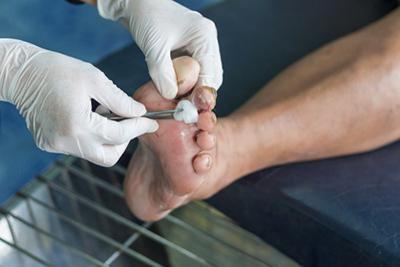Diabetic Foot Infections: Early Detection and Treatment

- posted: Feb. 14, 2024
Dr. Jesse Anderson, esteemed Doctor of Podiatry at AAL Podiatry Associates, maintains offices in Suffolk and Norfolk, VA. Our experienced doctor has provided diabetic foot care and routine care to the residents of these communities since 1986.
Today, our doctor wants to pass on vital information about infections of the lower extremities in people with diabetes, early detection, and the available treatment options. If you seek a highly experienced podiatric surgeon for any foot or ankle condition or if you have diabetes and need our services, our doctor awaits your call.
Diabetic Wound Infections
These infections involve the soft tissue or may spread to the bone. Diabetic people are at increased risk for them primarily due to neuropathy or peripheral arterial disease. This type of infection develops rapidly, so immediate treatment is of the utmost importance to avoid severe complications such as amputation and severe cellulitis.
Early Detection
A correct diagnosis helps in the early detection of these infections.
AAL Podiatry Associates in Suffolk and Norfolk, VA, may perform the following steps in the detection process of diabetic foot wounds prior to creating the appropriate treatment plan.
- Take a medical history
- Medication review
- Physically examine the foot, lower leg, and ankle
- Determine the severity of the infection and grade it
- Assess skin, vascular, neurological, and musculoskeletal system
- Perform tests, X-rays, A1C, cultures of infection, possible bone culture, foot radiographs, MRI, bone scan, and possible hospital admission
Treatment
- Antibiotics according to test and culture results
- Debridement of dead tissue
- Always treat wounds for Staph aureus and Strep
If you are diabetic and notice skin problems with your feet, ankles, and lower legs, call us for an immediate appointment, as time is of the essence. Neuropathy can prevent diabetic people from noticing wounds until infections can become advanced, and peripheral artery disease may impede their immune response.
Seeking an Experienced Virginia Podiatrist?
Call Dr. Anderson today in one of his office locations in Suffolk and Norfolk, VA, and schedule a routine or diabetic foot care appointment—Suffolk, VA, at 757-539-2098 or Norfolk, VA, at 757-625-2962.
It is wise that you become established with a quality podiatry office to care for your lower extremity health. If you have diabetes, it is vital to call us and make an appointment at regular intervals so we can help you monitor the condition of your feet, lower legs, and ankles. Regular checkups help to avoid severe diabetic complications that can happen quickly and without much warning.

- posted: Feb. 14, 2024
Dr. Jesse Anderson, esteemed Doctor of Podiatry at AAL Podiatry Associates, maintains offices in Suffolk and Norfolk, VA. Our experienced doctor has provided diabetic foot care and routine care to the residents of these communities since 1986.
Today, our doctor wants to pass on vital information about infections of the lower extremities in people with diabetes, early detection, and the available treatment options. If you seek a highly experienced podiatric surgeon for any foot or ankle condition or if you have diabetes and need our services, our doctor awaits your call.
Diabetic Wound Infections
These infections involve the soft tissue or may spread to the bone. Diabetic people are at increased risk for them primarily due to neuropathy or peripheral arterial disease. This type of infection develops rapidly, so immediate treatment is of the utmost importance to avoid severe complications such as amputation and severe cellulitis.
Early Detection
A correct diagnosis helps in the early detection of these infections.
AAL Podiatry Associates in Suffolk and Norfolk, VA, may perform the following steps in the detection process of diabetic foot wounds prior to creating the appropriate treatment plan.
- Take a medical history
- Medication review
- Physically examine the foot, lower leg, and ankle
- Determine the severity of the infection and grade it
- Assess skin, vascular, neurological, and musculoskeletal system
- Perform tests, X-rays, A1C, cultures of infection, possible bone culture, foot radiographs, MRI, bone scan, and possible hospital admission
Treatment
- Antibiotics according to test and culture results
- Debridement of dead tissue
- Always treat wounds for Staph aureus and Strep
If you are diabetic and notice skin problems with your feet, ankles, and lower legs, call us for an immediate appointment, as time is of the essence. Neuropathy can prevent diabetic people from noticing wounds until infections can become advanced, and peripheral artery disease may impede their immune response.
Seeking an Experienced Virginia Podiatrist?
Call Dr. Anderson today in one of his office locations in Suffolk and Norfolk, VA, and schedule a routine or diabetic foot care appointment—Suffolk, VA, at 757-539-2098 or Norfolk, VA, at 757-625-2962.
It is wise that you become established with a quality podiatry office to care for your lower extremity health. If you have diabetes, it is vital to call us and make an appointment at regular intervals so we can help you monitor the condition of your feet, lower legs, and ankles. Regular checkups help to avoid severe diabetic complications that can happen quickly and without much warning.
